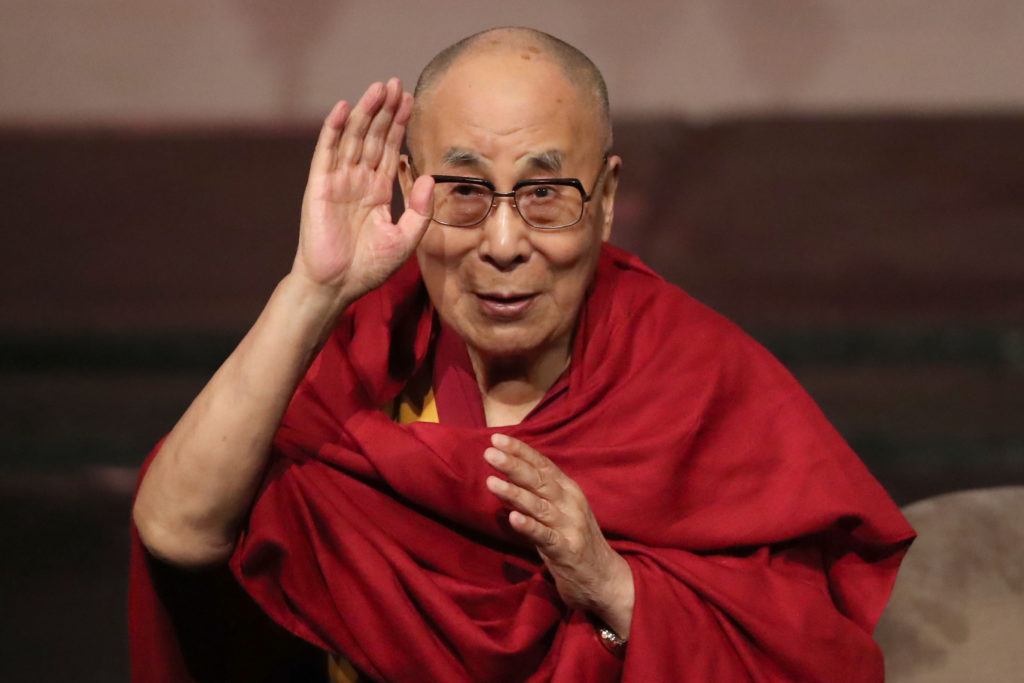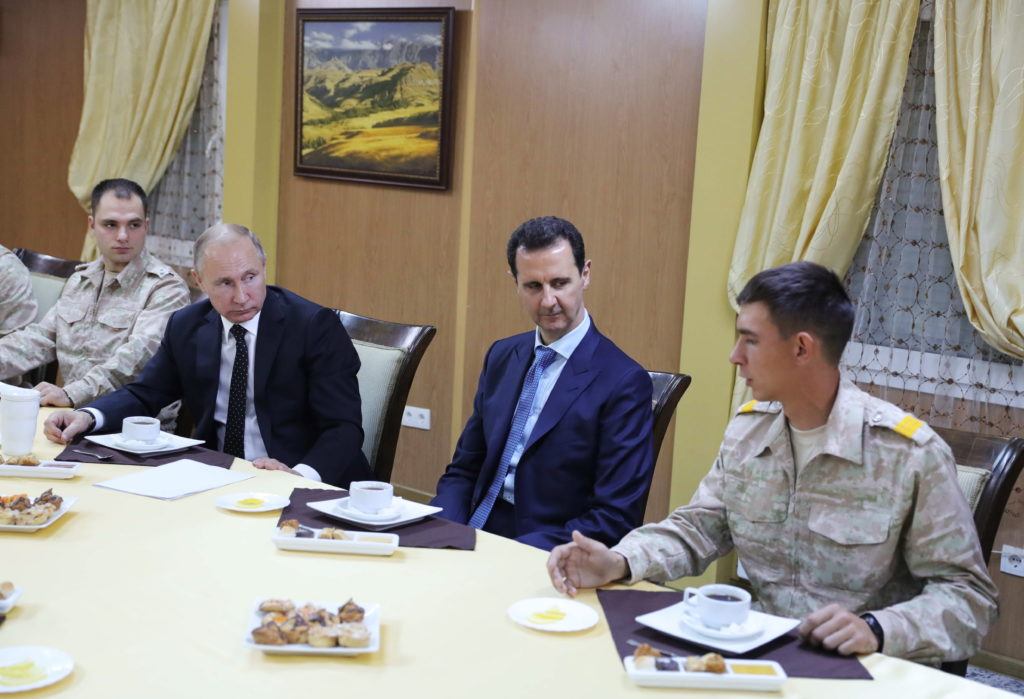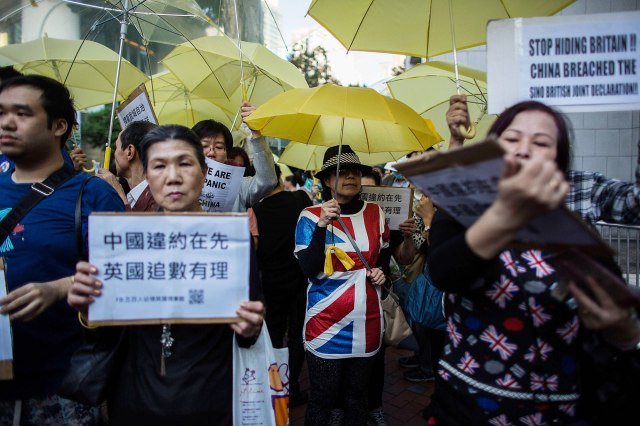The Umbrella Protest in Hong Kong has grown into a pro-democracy political movement. (Photo by Lam Yik Fei)

In order to be a reliable partner on the international stage, two fundamentals are required of any nation or bloc of nations. The first is to be a good enemy. The second is to be a good friend. The West has been failing on both of these fronts in recent years.
If you were hoping to become a state – like the Kurds of northern Iraq, for instance – or were a non-aligned state looking to make an alignment, would you choose Western powers like Britain or America? The question is at least on the table, if not already answered negatively.
The first assignment that any prospective partner looking to make an alliance might give themselves would be to try to work out whether the promises that the Western powers give are held to. Do their words matter? Can they be counted upon? Everywhere, there are signs that they cannot, and that when the world turns away the Western powers forget the promises they once made.
Few examples reek so much as that of Hong Kong. When the British handed over the island to China, in 1997, numerous promises were made and reassurances given. Before the handover, the then British Prime Minister, John Major, memorably proclaimed that Hong Kong would “never have to walk alone”. In the years since, it has teetered delicately and all-but-unprotected from the increasing interference of the Chinese authorities.
The Prince of Wales building, once the British army’s headquarters in Hong Kong, was renamed the Chinese People’s Liberation Army Forces Hong Kong Building, and a great five-pointed red communist star was fixed to the building’s top. Those who thought such changes were mere braggadocio soon discovered they were merely the most outward symbol of a change of governance that would gradually affect absolutely everything.
In 2015, when Hong Kong booksellers suspected of selling material critical of the Chinese authorities started to disappear, the world took some notice. They all eventually reappeared but, despite intermittent protestations, some have been re-arrested (most recently the case of the scholar and book publisher Gui Minhai). Meanwhile, the political movement which grew out of the 2014 umbrella protests finds itself continuously targeted by Beijing. Members of the Demosisto party who have been elected to office are right now being removed from office by the regime they are criticising.

Members of Demosisto have called on Theresa May to speak out this week about the erosion of rights in Hong Kong and to uphold the promises and reassurances of her predecessor as Conservative Prime Minister. But the Western powers find themselves over Hong Kong in the same conundrum they are in with the Dalai Lama. Meet with the Dalai Lama and be seen to raise the issue of Tibet and (as David Cameron discovered while he was prime minister) the Chinese retaliate by cancelling any and all further meetings until such a time as there is a formal, indeed grovelling apology for such an insult.
Elsewhere, the West appears reluctant even to support those who are defending precisely those values that it claims to hold dear. When the British and American governments committed themselves to the eradication of ISIS in the Middle East, they did not send their own personnel to the ground to lead the fighting.
Instead they chose to wage the war from the air and to encourage their Kurdish allies in the region to do all the heavy-lifting and indeed the heavy-fighting. It is only because of the sacrifices and dedication of Kurdish forces that ISIS has been pushed back from the areas it so startlingly and devastatingly grabbed across the Nineveh plains and beyond in 2014.
Yet the Western powers that urged the Kurds on in that fight did not also urge on the rights of those same people to a self-determination that is more earned than any other. Indeed, while self-determination may be urged in the case of peoples who show no particular pro-Western line or actively pursue an anti-Western agenda (such as the Palestinian Authority of Mahmoud Abbas), the Western states still refuse to back the right of self-determination for the most provably loyal – not to mention provably useful – ally it is possible to imagine.
Instead, they pursue a form of cynical realpolitik with the increasingly authoritarian and anti-Western regime of Recep Tayyip Erdogan in Turkey, and maintain that alliance at the cost of the Kurds. It is neither a demonstration of good friendship nor of great gratitude.

Across the world, such movements and calculations are noticed and weighed up. And such failings are not noticed in a vacuum. They are noticed alongside, for instance, the observation that Vladimir Putin’s Russia has been a remarkably loyal and determined ally (for its own cynical reasons, to be sure) to the Assad regime in Syria.
Had Russia not been such a staunch ally of Damascus, then Bashar al-Assad would have disappeared as fast as a regime-critical bookseller on the streets of Hong Kong. As others in the region who have taken an increasingly pro-Russian line in recent years have said explicitly: “What do you expect us to do? If the West walks away we look for other friends.” Or as one Iraqi Christian put it to me last year: “Is there any point in putting our faith in Western powers?”
There is little or nothing in the Russian approach to foreign affairs that is worth emulating. But the perception of being a loyal friend is a rare exception. As is the perception – often one that does not even require the exercise of considerable amounts of power – that the West is a bad enemy to make.
Britain currently estimates its defence capabilities by the measure of whether or not we could still re-take the Falkland Islands, if necessary. To say that this is a low-grade ambition for a global power is to understate matters: it is a miserable height at which to put a nation’s ambitions.
There are many specifics of foreign policy that will continue to be argued over in Washington and London. But if they have any desire to pursue a longer-term strategy it should be based on the central aspiration of proving to your friends that they are lucky, and to your enemies that they will have to hope their luck continues to hold.










Join the discussion
Join like minded readers that support our journalism by becoming a paid subscriber
To join the discussion in the comments, become a paid subscriber.
Join like minded readers that support our journalism, read unlimited articles and enjoy other subscriber-only benefits.
Subscribe